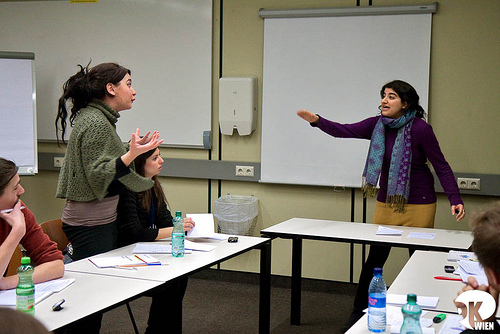
Recently, there have been efforts to form a debate club at Bard College Berlin. A group of students have come together for this purpose and have collectively joined their talents and previous debating experience to produce a new trend among our community. The enthusiasm surrounding the initiation of the college’s own debate club motivated me to share my debating experience with the Berlin Debating Union at Humboldt University.
When I first came to Bard College Berlin in 2010, I decided to look for a debate club in Berlin, so as to continue to improve my debating skills. It seemed to me at the time that debating was more of a trend in the English–speaking world, particularly in England. As I was leaving Pakistan to resume my studies in Berlin, I had little hope that I would find English debating societies in Germany. To my pleasant surprise, not only did English debating exist in Germany, but Berlin itself also boasted one of Europe’s largest debating societies. And it was only by chance that one of my colleagues here at Bard College Berlin, April Matias, informed me of it and promised to take me there as well.
And so we went to Humboldt University on Friedrichstrasse, which was humming with the voices of students coming in and out of the university buildings, on a cold rainy November night. I was hooked even from the very first session. As we entered a large seminar room, we saw people sitting casually (mostly German speakers), as there was a training going on. This training session then led to a debating session of about one hour. People were relaxed and most friendly, so soon my stress and anxiety about speaking in front of a large number of people, who were completely unknown to me, went away.
Coming from Pakistan, I had four years of very vibrant debating experience. As part of the British legacy, Pakistani institutions have inherited a tradition in what is called “parliamentary style” debating. In this debating approach, there are always two teams, although depending on whether it’s “university style” or “world school style” the number of people in each team differs. In the “university style,” the team is comprised of two people, while in the “world school style” the team consists of three. In both styles, a certain view on a topic is given to the teams and one team has to defend this view while the other has to oppose it. It is this structure of the debate which is the trickiest part.
The first speaker from the Team Proposition takes the floor and thus sets the whole debate in motion. The speaker defines the topics for the whole House. At this stage of the debate, the Team Opposition has to carefully listen and prepare their case. They also have to comply with the terms and definitions of the topics set out by the Team Proposition. For example, if the topic reads as: ‘This House believes that single sex schools should be banned’, Team Proposition can choose to restrict this case to a specific country, for instance, they could argue that single sex schools should be banned in Germany or the USA. The way Team Proposition deals with the topic remains completely in their hands. The ultimate job of Team Opposition in turn is to show to the judges on what grounds the case of Team Proposition is weak and actually fails to convince the House of what they are proposing (while, nevertheless, always keeping to the terms and definitions set out by the Team Proposition).
Such are the intricacies involved in debating. Thus, to be able to respond well on the spot, debaters are extremely well read and quick in their thinking. Debating enhances one’s mental capacity to be able to think and critically analyze situations quickly, as well as to come up with the best possible solutions/arguments and counter-arguments, especially while dealing with unanticipated situations and problems.
In both styles of debating, it is the last speakers who summarize the cases and prove to the judge that their team has a more convincing argumentation. The last speaker’s job therefore is to take notes throughout the session and make sense of all the various arguments presented in the first half an hour of debating. Through the debates in which I participated, I gradually picked up all the nuances and tricks involved in the art of oratory. My debating practice in Berlin ultimately led me to also visit institutions like Sciences Po Paris, Vienna University, Sciences Po Le Havre, Jacobs University in Bremen etc. I thoroughly enjoyed travelling around Europe with the debating team, while being engaged in intellectual arguments and discussions. And though debating had opened up the world of intellectual dialogue to me, it was the people who sustained my interest the most.
The people make debating the most captivating experience of all. I met people who have remained my friends for life and who, with their wit and humor, brought a lot of joy in my life. Although my debating career lasted only five years, I’ve met hundreds of interesting people, and learnt from their ingenuous experience and failures. The friends that I made in Berlin I visit ever so often and meet regularly for badminton or tea. Debating not only taught me how to think, but also introduced me to one of the most interesting groups of people one can ever find.
Debating and travelling for debates has been one of the most worthwhile experiences in my life, and I hope that Bard College Berlin’s debaters will benefit similarly from theirs. Through participating in debates, one learns to expand the mind and also to find a wide social network of potential friends all around the world.
